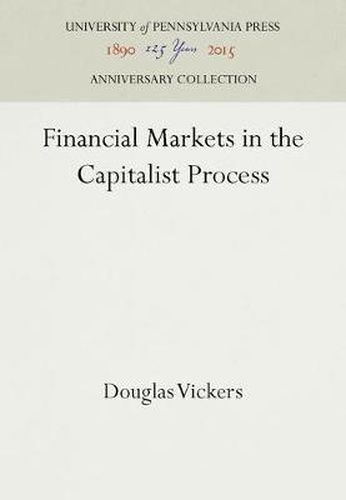Readings Newsletter
Become a Readings Member to make your shopping experience even easier.
Sign in or sign up for free!
You’re not far away from qualifying for FREE standard shipping within Australia
You’ve qualified for FREE standard shipping within Australia
The cart is loading…






This title is printed to order. This book may have been self-published. If so, we cannot guarantee the quality of the content. In the main most books will have gone through the editing process however some may not. We therefore suggest that you be aware of this before ordering this book. If in doubt check either the author or publisher’s details as we are unable to accept any returns unless they are faulty. Please contact us if you have any questions.
The preoccupation of financial theory with static, timeless, equilibrium analysis has given rise to an orthodoxy that avoids the problems of uncertainty in the world. This work establishes new perspectives from which contemporary financial theory can be evaluated. Echoing Keynes’ observation that Human decisions … cannot depend on strict mathematical expectation, Douglas Vickers explains why most decisions in economics and finance are not made under conditions to which the calculus of probability applies.
The author proposes a new realism in financial theory that takes into account the uncertainty in personal and economic decisions. Both business firms and financial investors, he contends, acquire an important perspective on their alternatives by focusing on the transitional, disequilibrium processes in financial markets rather than on their sup posed equilibrium conditions. This involves for economic decisions an understanding of time as historic in a genuine operational sense rather than as merely a logical variable. The notion of probability should be replaced by that of possibility, the concept that the British economist G. L. S. Shackle has called potential surprise.
In Part I, Vickers’ innovative approach leads to a careful study of the false trading that occurs in real and financial markets. Part II provides an exposition and an evaluation of the equilibrium theory of financial asset prices. The new analytical apparatus is applied in Part Ill to investment decision making in the firm and to the choice of financial asset portfolios, as well as to the questions of asset trading and changes in portfolio composition.
A scholarly and constructive work, Financial Markets in the Capitalist Process will generate controversy among professionals and debate among students for many years to come.
$9.00 standard shipping within Australia
FREE standard shipping within Australia for orders over $100.00
Express & International shipping calculated at checkout
This title is printed to order. This book may have been self-published. If so, we cannot guarantee the quality of the content. In the main most books will have gone through the editing process however some may not. We therefore suggest that you be aware of this before ordering this book. If in doubt check either the author or publisher’s details as we are unable to accept any returns unless they are faulty. Please contact us if you have any questions.
The preoccupation of financial theory with static, timeless, equilibrium analysis has given rise to an orthodoxy that avoids the problems of uncertainty in the world. This work establishes new perspectives from which contemporary financial theory can be evaluated. Echoing Keynes’ observation that Human decisions … cannot depend on strict mathematical expectation, Douglas Vickers explains why most decisions in economics and finance are not made under conditions to which the calculus of probability applies.
The author proposes a new realism in financial theory that takes into account the uncertainty in personal and economic decisions. Both business firms and financial investors, he contends, acquire an important perspective on their alternatives by focusing on the transitional, disequilibrium processes in financial markets rather than on their sup posed equilibrium conditions. This involves for economic decisions an understanding of time as historic in a genuine operational sense rather than as merely a logical variable. The notion of probability should be replaced by that of possibility, the concept that the British economist G. L. S. Shackle has called potential surprise.
In Part I, Vickers’ innovative approach leads to a careful study of the false trading that occurs in real and financial markets. Part II provides an exposition and an evaluation of the equilibrium theory of financial asset prices. The new analytical apparatus is applied in Part Ill to investment decision making in the firm and to the choice of financial asset portfolios, as well as to the questions of asset trading and changes in portfolio composition.
A scholarly and constructive work, Financial Markets in the Capitalist Process will generate controversy among professionals and debate among students for many years to come.